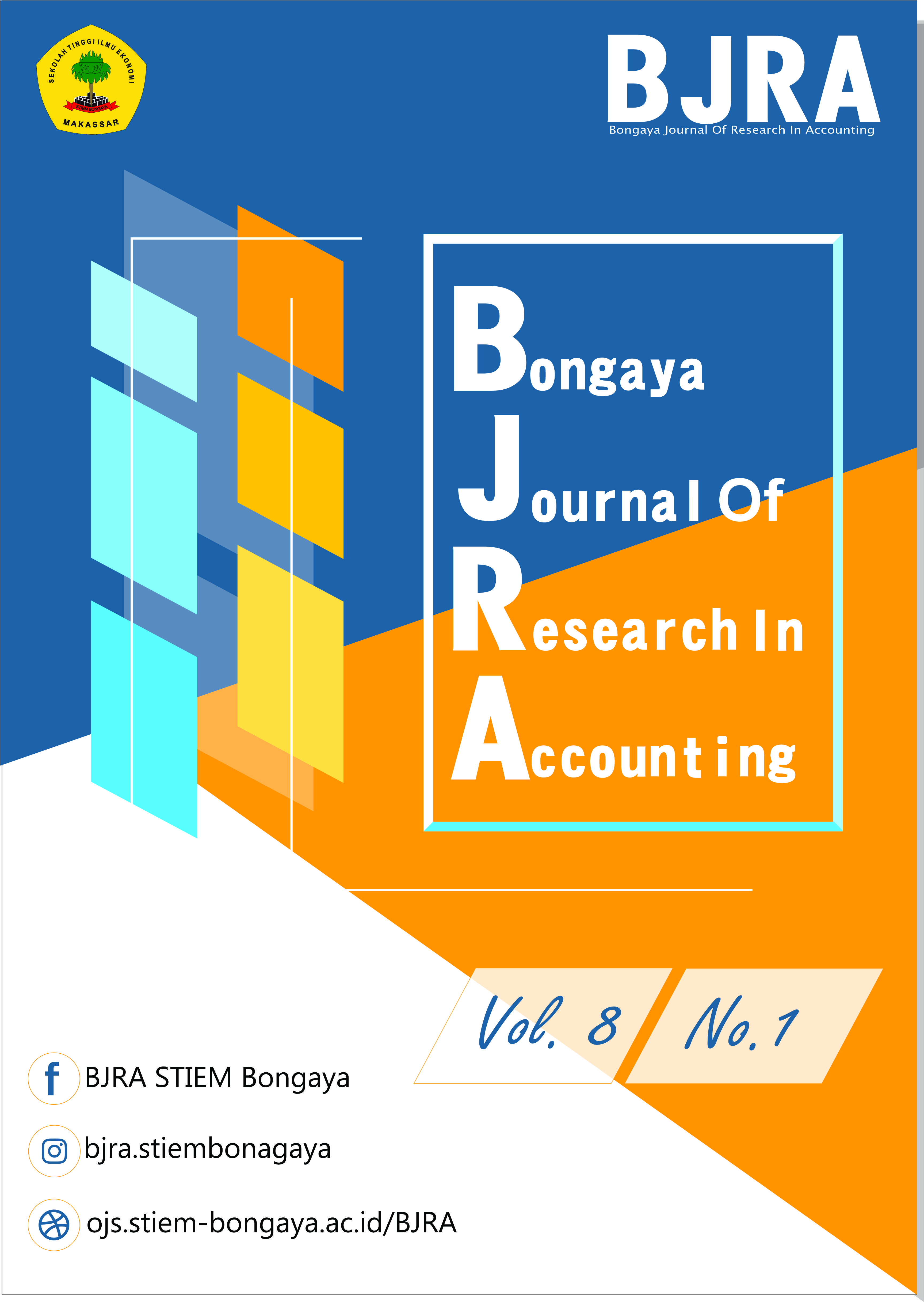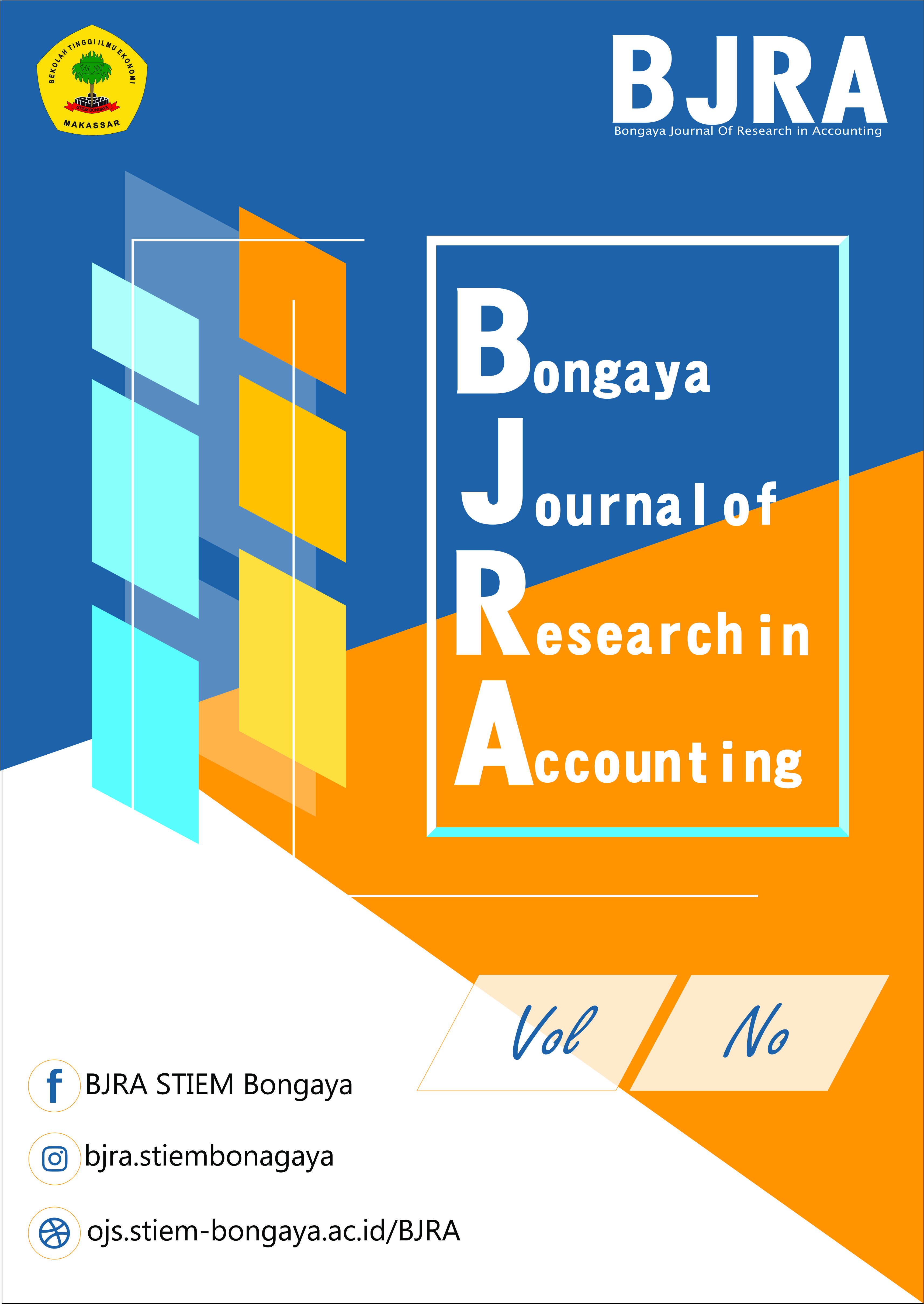Di Balik Angka: Memahami Fenomena Budgetary Slack Dan Implikasinya Terhadap Kinerja Organisasi
DOI:
https://doi.org/10.37888/bjra.v8i1.647Keywords:
Penganggaran dan Perilaku, dan Kelonggaran AnggaranAbstract
Fenomena Budgetary slack terjadi ketika manajer sengaja menyusun anggaran dengan target yang lebih rendah dari yang sebenarnya dapat dicapai. Tujuannya adalah untuk menciptakan "buffer" atau "kelebihan" yang dapat digunakan untuk menghadapi ketidakpastian di masa depan atau untuk melindungi diri dari evaluasi kinerja yang negatif. Penelitian ini bertujuan untuk mengidentifikasi pemicu terjadinya budgetary slack, menggali fenomena perbedaan budgetary slack antara sektor publik dan swasta, mengidentifikas bagaimana budaya organisasi yang berbeda mempengaruhi perilaku budgetary slack, bagaimana perkembangan teknologi informasi mempengaruhi praktik budgetary slack dan dampaknya terhadap Kinerja organisasi serta strategi dalam mencegah dan mengatasi budgetary slack. Penerapan metode Systematic Literature Review dalam penelitian ini dengan menggunakan metode prisma bantuan tools Watase Uake. Hasil Penelitian menunjukkan bahwa fenomena budgetary slack dipengaruhi oleh berbagai faktor, termasuk asimetri informasi, partisipasi dalam penyusunan anggaran, motivasi pribadi, dan strategi organisasi. Perbedaan antara sektor publik dan swasta dalam praktik budgetary slack juga ditemukan, di mana sektor publik lebih dipengaruhi oleh tekanan politik dan akuntabilitas, sedangkan sektor swasta lebih terkait dengan insentif kinerja. Oleh karena itu, strategi untuk mencegah slack meliputi peningkatan transparansi, partisipasi dalam penyusunan anggaran, dan penguatan budaya organisasi yang menekankan integritas. Penelitian ini memberikan kontribusi pada teori akuntansi perilaku dan menawarkan rekomendasi praktis bagi manajemen dalam merancang sistem penganggaran yang lebih efektif.
References
Agustina, H., Elfita, R. A., Zhulqurnain, M. R. I., Arif, D., & Primasari, N. S. (2024). MODERATING PERSPECTIVE OF ORGANIZATIONAL CULTURE: LEADERSHIP STYLE AND OBEDIENCE PRESSURE ON BUDGETARY SLACK. Revista de Gestao Social e Ambiental, 18(7). https://doi.org/10.24857/rgsa.v18n7-015
Al Jasimee, K. H., & Blanco-Encomienda, F. J. (2024). Decoding task uncertainty: moderating effects on participative budgeting and budgetary slack dynamics. Total Quality Management and Business Excellence, 35(7–8), 739–757. https://doi.org/10.1080/14783363.2024.2332897
Bozanic, Z., Ferguson, A., & Pündrich, G. (2024). Managing Expectations Through Budgetary Slack: Evidence from Project Financing. European Accounting Review. https://doi.org/10.1080/09638180.2024.2312177
Damayanti, R. A. (n.d.). THE CONSEQUENCES OF CONTROL OVER BUDGETARY SLACK AND MANAGERIAL ORIENTATION IN PROMOTING BUDGETING HARMONIZATION.
Daumoser, C., Hirsch, B., & Sohn, M. (2018). Honesty in budgeting: a review of morality and control aspects in the budgetary slack literature. Journal of Management Control, 29(2), 115–159. https://doi.org/10.1007/s00187-018-0267-z
De Baerdemaeker, J., & Bruggeman, W. (2015). The impact of participation in strategic planning on managers’ creation of budgetary slack: The mediating role of autonomous motivation and affective organisational commitment. Management Accounting Research, 29, 1–12. https://doi.org/10.1016/j.mar.2015.06.002
Deng, D., Liu, L. Y. J., & Wen, S. (2020). The Impact of Accountability-Oriented Control Aspects of Variance Investigation on Budgetary Slack and Moderating Effect of Moral Development. Frontiers in Psychology, 11. https://doi.org/10.3389/fpsyg.2020.583643
Dos Santos, V., Beuren, I. M., & Skrepitz, S. (2022). Influence of budgetary slack and elements of the budgetary process on perceptions of justice. Revista Contabilidade e Financas, 33(89), 200–215. https://doi.org/10.1590/1808-057x202113780
Douthit, J., Schwartz, S. T., Stevens, D. E., & Young, R. A. (2016). The Effect of Endogenous Contract Selection on Budgetary Slack: An Experimental Examination of Trust, Distrust, and Trustworthiness. SSRN Electronic Journal. https://doi.org/10.2139/ssrn.2742353
Elmassri, M., & Harris, E. (2011). Rethinking budgetary slack as budget risk management. Journal of Applied Accounting Research, 12(3), 278–293. https://doi.org/10.1108/09675421111187700
Gago-Rodríguez, S., & Naranjo-Gil, D. (2016). Effects of trust and distrust on effort and budgetary slack: an experiment. Management Decision, 54(8), 1908–1928. https://doi.org/10.1108/MD-10-2015-0480
Liessem, T., Schedlinsky, I., Schwering, A., & Sommer, F. (2015). Budgetary slack under budget-based incentive schemes—the behavioral impact of social preferences, organizational justice, and moral disengagement. Journal of Management Control, 26(1), 81–94. https://doi.org/10.1007/s00187-015-0206-1
Lucyanda, J., & Sholihin, M. (2023). The effect of gender and code of ethics on budgetary slack ethical judgment: experimental evidence from Indonesia. Journal of Economics, Finance and Administrative Science, 28(56), 273–286. https://doi.org/10.1108/JEFAS-05-2021-0044
Massaro, M., Dumay, J., & Guthrie, J. (2016). On the shoulders of giants: undertaking a structured literature review in accounting. Accounting, Auditing and Accountability Journal, 29(5), 767–801. https://doi.org/10.1108/AAAJ-01-2015-1939
Mediaty, Habbe, A. H., Sundari, S., Mas’Ud, A. A., & Arifin, A. H. (2024). BUDGETING BEHAVIOR: INDONESIAN LOCAL GOVERNMENT BUDGET PREDICTIONS. Revista de Gestao Social e Ambiental, 18(9). https://doi.org/10.24857/rgsa.v18n9-081
Nottar, D. I. da S., Schiavo, P. dos S., Vesco, D. G. D., & Santos, C. A. dos. (2022). The effect of the dark triad traits on the relationship between obedience pressure and budgetary slack,. Revista Contabilidade & Finanças, 33(90). https://doi.org/10.1590/1808-057x20211455.en
Park, S. J., & Jang, S. (2021). Asymmetric information and excess budget: the influence of performance-based budgeting on budgetary slack in US states. International Review of Public Administration, 26(4), 353–372. https://doi.org/10.1080/12294659.2022.2027599
Ramlall, R., & Grobbelaar, S. (2024). Deficiencies in the traditional budgeting process cause the negative behaviour of budgetary slacking. South African Journal of Business Management, 55(1). https://doi.org/10.4102/sajbm.v55i1.4348
Wei, W. (2021). Exploring local government fiscal slack in a political-budgetary-managerial framework. Public Management Review, 23(10), 1504–1526. https://doi.org/10.1080/14719037.2020.1764085.










